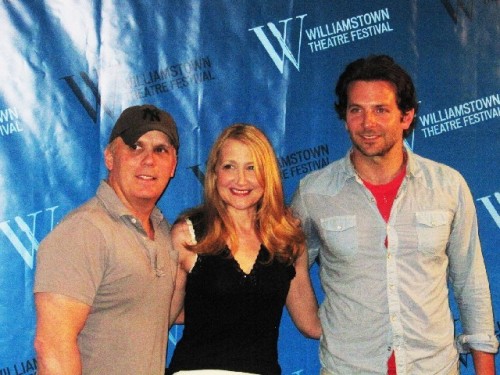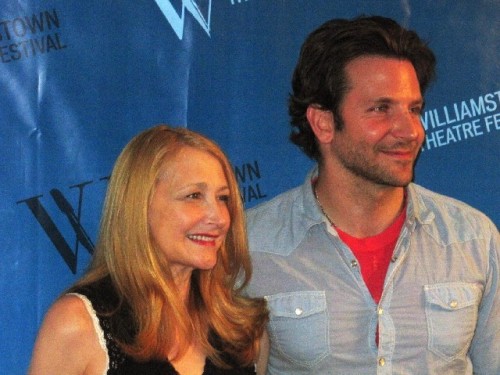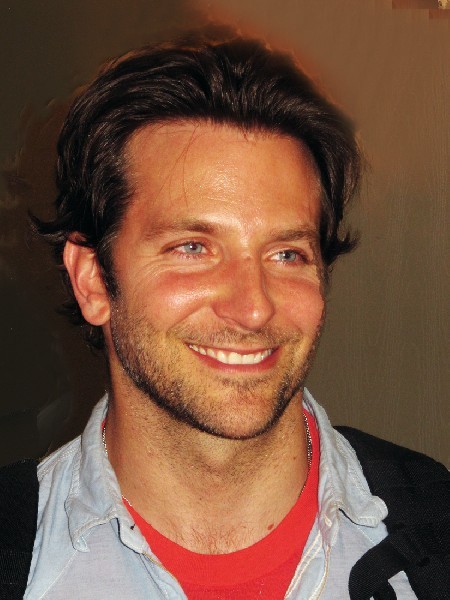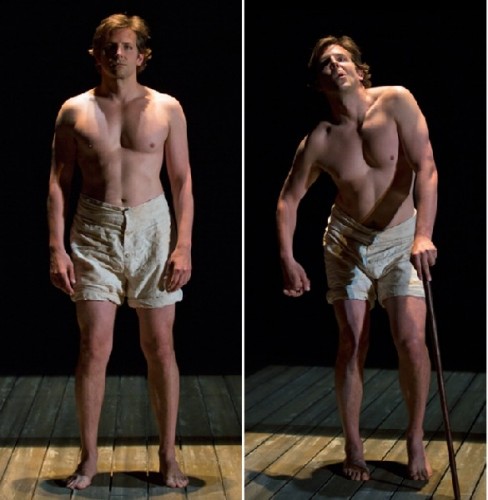Bradley Cooper's Elephant Man
Broadway for the Fall 2014
By: Charles Giuliano - Aug 17, 2012
With Bradley Cooper and Patricia Clarkson co-starring they enjoyed a sold out run of Elephant Man at the Williamstown Theatre Festival in 2012. They discussed the desire to take the production to Broadway.
In the past two years Bradley Cooper has twice been nominated for an Oscar. Last year for Silver Linings Playbook and currently as best supporting actor in the all star cast of American Hustle. His performance in Elephant Man was demanding and astonishing. His appearance was a coup for WTF. Bringing the show to Broadway, particularly with elevated star power over the last two years, would seem to be a sure thing. But there were issues of his busy film schedule as well as finding a suitable theater.
In Berkshire on Stage and Film our colleague Larry Murray reports that progress has been made. The Broadway production "...will be Fall of 2014 according to James L. Nederlander, the producer. The dates and theatre have not yet been announced, though Nederlander said it is expected to be a Shubert run Theatre, not one of his own Nederlander Theatres, all of which are currently lit. Cooper, currently an Oscar nominee for American Hustle will rejoin Patricia Clarkson and Alessandro Nivola who also appeared in the Williamstown Theatre Festival play with him."
During a film premiere in 2012 Cooper was heard to say “We’re going to try to do it on Broadway next fall. We’re going to try to nail it down and do a limited run.” That was told to someone who told someone. It went viral on Facebook.
In a release at the time Jenny Gersten, Artistic Director of the Williamstown Theatre Festival said “We’re thrilled that Bradley wants to continue exploring the role of John Merrick. The entire production of The Elephant Man at Williamstown was definitely a season highlight, although there is nothing confirmed beyond that at this point.” She told the Huffington Post “When [Cooper] was here in the production, he said, ‘I really am interested in this play. I want to keep doing it.’”
The role is physically demanding as, without benefit of prosthesis or makeup, Cooper astonished audiences by twisting and contorting himself into a simulacrum of the hideously deformed, utterly fascinating, 19th century freak show phenomenon, Joseph Merrick.
During a an interview with Gersten (who has since resigned but has planned the 2014 season which is yet to be announced) she emphasized that it is not the mandate for WTF to prepare shows for Broadway or Off Broadway. The hope is to offer opportunities for actors to experiment and develop new works. If some shows, like that season’s new musical Far From Heaven do move to New York, well, all the better. But the greater intention is to do serious and compelling work.
“I think the reason people come here, no offense, is to be protected from the critics in a lot of ways” She said. “And to take chances in a lot of what they can’t do in other places where the spotlight is a lot brighter. If that makes sense.”
I asked Jenny what it took to lure a Hollywood star like Cooper to WTF?
“It wasn’t me. He wanted to come here. I get no credit for that.” She said. “They (stars) all came here for two reasons in my opinion. The projects, the material, the people who were working on the shows with them. And the fact that they love to come to Williamstown.”
Part of that comfort zone is allowing actors some privacy. “I don’t think Bradley would have done Elephant Man here if the national press was invited. That was a specific agreement we had with the author actually,” Gersten said.
The drama Elephant Man is based on the life story of Joseph Carey Merrick (5 August 1862 – 11 April 1890), sometimes incorrectly referred to as John Merrick. He was an Englishman with severe deformities who was exhibited as a human curiosity named the Elephant Man.
Merrick began to develop abnormally during the first few years of his life. His skin appeared thick and lumpy. He developed an enlargement of the lips, and a bony lump grew on the forehead. One of his arms and both feet became enlarged and at some point during his childhood he fell and damaged his hip, resulting in permanent lameness. When he was 11, his mother died and his father soon remarried. Merrick left school at 12, and had difficulty finding employment. Rejected by his father and stepmother, he left home. Aged 17, Merrick entered the Leicester Union workhouse.
In 1884, after four years in the workhouse, Merrick contacted a showman, Sam Torr, who named him the Elephant Man. He was exhibited across the street from the London Hospital. He was visited by the surgeon Frederick Treves, who invited Merrick to be examined and photographed. Soon after Merrick's visits to the hospital, he toured in Europe.
In Belgium, Merrick was robbed by his road manager and abandoned. He eventually made his way back to London. Unable to communicate, he was found by the police to have Frederick Treves' card on him. Treves came and took Merrick to the London Hospital. Although his condition was incurable, Merrick was allowed to stay at the hospital for the remainder of his life. Treves visited him daily and they developed a friendship. Merrick also received visits from the wealthy ladies and gentlemen of London society, including Alexandra, Princess of Wales.
Merrick died on 11 April 1890, aged 27. The official cause of death was asphyxia, although Treves, who dissected the body, said that Merrick had died of a dislocated neck. He believed that Merrick—who had to sleep sitting up because of the weight of his head—had been attempting to sleep lying down, to "be like other people".
The exact cause of Merrick's deformities is unclear. In a 2012 press conference we discussed the production and its challenges.
Bradley Cooper I didn’t even know there was a play The Elephant Man. When I grew up, my father showed me David Lynch’s movie with Anthony Hopkins and John Hurt that he made in 1980. That became one of the reasons I wanted to become an actor. That character was always imprinted in myself, forever. So when I was in Grad School, I discovered the play by Bernard Pomerance. I had a bit of a tough time getting it passed as my thesis. They finally allowed me to do it, and it was a wonderful experience. At that time Billy Crudup was doing it on Broadway, but I never got a chance to see it. I always wanted to do it. Then I thought what a great venue to do it at Williamstown. There is that wonderful synergy between Dr. Frederick Treves, Mrs. Kendal, and Merrick.
I had a wonderful experience with Scott (Ellis) doing The Understudy at Williamstown. Before we did The Understudy, I mentioned how much I wanted to do The Elephant Man. Scott was one of the only ones who didn’t laugh at me saying that. He took pity on me. When I first met Patty, one of the first things I ever said to her was that she would be one of the best Mrs. Kendals.
Patricia Clarkson I think it was one of the first things he said to me. Hello, when do we do The Elephant Man.
BC At the Tribeca Film festival five years ago. The fact that we are actually here and doing this is kind of miraculous. Allesandro Nivola is just perfect for Dr. Frederick Treves. What a coup. When Scott and I were thinking who could we get having Patty and Allesandro to help tell the story is really a dream.
PC He’s shooting a movie right now and has a killer schedule. He’s shooting in Atlanta and is back and forth.
BC It kind of all came together.
Scott Ellis And Williamstown, as you all know, is such a great place. Hopefully, we do it and all have a good time. There’s a certain pressure, but it’s very different when you’re up here. Hopefully, you just embrace that feeling of doing the work. Not worrying about what happens. It’s about getting in the room and playing. Enjoying it, and that’s the best part of it.
Charles Giuliano Many of us fondly recall The Understudy. It was one of the greatest productions ever staged here in the Nikos Theatre. Particularly the extraordinary set.
BC Yeah. That was incredible.
CG The production values at WTF are amazing. It’s wonderful to welcome you back. I understand that you (Cooper) are the most gorgeous man on the planet. Or something like that.
BC You spoke with my mother?
CG Can you describe the emotional arc from being such an admired human being, physically, to playing someone who was so physically afflicted?
BC Well. Thank you. That’s nice to hear about the aesthetic. My experience is not that in my life. I think you’re referring to the People Magazine thing. (2011 Sexiest Man Alive) But outside of that it hasn’t been something I’ve grown up dealing with. It hasn’t been something I’ve ever had to navigate through. So there’s no context for me to answer your question. Have I been able to deal with it? It’s never been an issue. My feeling with Merrick. The physical affliction is a massive undertaking.
It’s a very interesting thing to do as an actor-- to take just what aspect of a physical malady plagued him. They were myriad. And just how he would go about during the day. Even going to the bathroom what it would entail. The thing I love most about him is just how much he wanted to belong and be a part of. That’s something I can very much relate to. In my life. So I don’t, I don’t want to say it’s easy to play Merrick but there’s a natural affinity and connection I feel to him. Who I think he was. Having read the play. And who in my imagination I think he is. It’s actually a very natural connection I feel to him which is why I think that I would want to do it. Because, for me, that very visceral feeling I have to this man who lived in the late 1800s (1862-1890).
(Responding to a Berkshire Eagle question about the difference between film and theatre Cooped touched on the WTF experience)
…Frankly that it’s not 98 performances or a six months run on Broadway. It’s focused. You go in and do it. It’s done. You’re in and out. I like that aspect of it. I did one show on Broadway which I loved and was kind of life changing. But it’s brutal. This takes a different form. At Williamstown and I like that a lot.
PC Lucky thirteen. Thirteen performances.
Larry Murray of Berkshire on Stage You’ve had a long history of Elephant Man from when you were a kid. The Joseph Merrick story is as much about the internal pain as it is about his deformities. What is it like for you to play that?
BC It is very liberating and healing. I felt very humbled and grateful the first time I played it. I can’t imagine I wouldn’t have the same experience. I can’t foresee what it will be in a couple of weeks but it was very singular as opposed to other experiences I have had as an actor. Maybe because he was an actual human being. I felt there was really one objective for me as an actor and that was to do him justice. It makes it very simple and you can drown out everything else. It’s really about me and him. If I believe I’m him. Truly believe I’m him up there, then everything else is going to take care of itself.
I Berkshires Do you use any form of articifial advice?
BC Bernard Pomerance puts in the preface of the play that no one is allowed to do anything, make up, nothing. There has never been a production, it’s not allowed.
SE So it’s not a surprise you do see photographs of Merrick. If you don’t know the story you will see the photographs. From that the actor playing him takes on those characteristics body-wise. No make up. It’s the magic of theater.
BC Smartly, Pomerance talks about illusion constantly in the play. In that theater going place we have to go with the illusion.
CG We’re talking about an exceptional historical character. In his lifetime, he was a person of great celebrity who was sought out by all echelons of society including some extraordinary people. Can you verify this? Did Michael Jackson buy his bones? Could you talk about the nature of that celebrity?
BC I was a huge Howard Stern fan. When I was in eighth grade, I remember that Howard Stern tried to call and buy the Elephant Man’s bones. On air. And I thought, what has happened? And yes there was something about Michael Jackson.
PC Did he ultimately own them?
BC Howard Stern?
PC No, Michael Jackson.
BC When I was on Stern, I brought it up and said “Did you call?” He said “Yeah.”
CG Could you address the nature of his charisma during his lifetime. What was so compelling about him? How did that create him as a celebrity?
BC A lot of celebrity is about the production of that celebrity. It’s like Being There. If the guy doesn’t talk (Chance the Gardener by Peter Sellers) maybe he’s a genius. It all depends on how he was sold and marketed. Joseph Merrick at that time. He was five feet two inches. It was very difficult to understand him. In real life. So I don’t know how charismatic he was. How much was he a part of some machinery?
PC He was smart. Very intelligent. It was difficult to hear what he said, but when you did hear him it was worthy.
CG Like a Stephen Hawking?
BC We were talking about this walking over here. You never know what your legacy is going to be. We are doing this play right now about this guy who died at the age of 26. We’re doing this play in 2012, and we’re talking about him right now. That to me is so much more interesting than Michael Jackson trying to buy his bones. It’s all about stories. This guy’s story is very compelling. We all own it now. We own it while we’re preparing to do it, and you’ll own it when you watch it. He doesn’t own it anymore, and it’s all about his story. Whether it’s true that he was charismatic doesn’t even matter. Because the story is charismatic.







